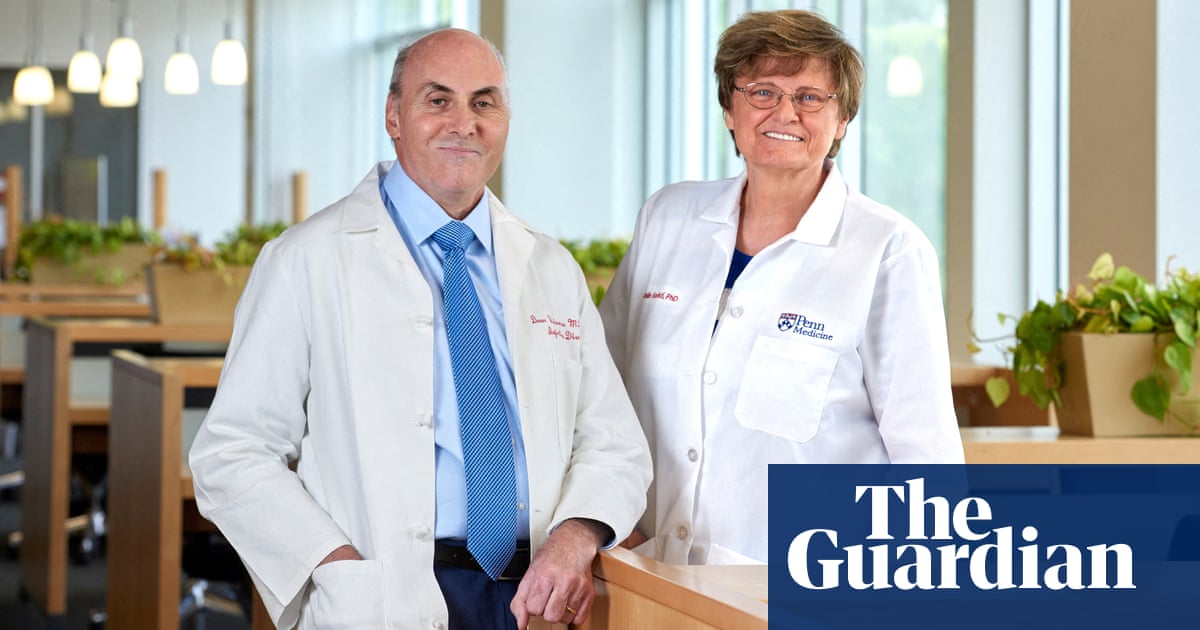
Two British researchers have won the most lucrative prize in science for work that dramatically improved the speed and reduced the cost of reading DNA, the molecular instructions for life.
Sir Shankar Balasubramanian and Sir David Klenerman, both professors at the University of Cambridge, share the $3m (£2.2m) Breakthrough prize in life sciences with Pascal Mayer, the founder of the French firm Alphanosos, for creating next-generation genome sequencing, or NGS.
The technique has transformed biology and medicine by allowing researchers to read human genomes a million times faster and at a fraction of the cost of early approaches. While scientists took a decade and $3bn to read the first human genome, a top-end machine today can perform the task in an hour for $1,000.
“These prizes go to a small number of people, but I’m delighted on behalf of the many who contributed to the work,” said Balasubramanian, who was in London for a family party when he heard he had won. “It was a real surprise, a call out of the blue.”
Armed with NGS, researchers can look beyond the genome of the species to variations in the genetic makeup of individuals, then tease out how sometimes subtle differences in DNA can affect human biology and the onset of diseases.
In the pandemic, scientists used NGS to read and share the genetic code of the coronavirus, a crucial step for developing diagnostic tests and vaccines. It has since been used to monitor the emergence of troubling variants around the world.
“It’s had a massive impact and much more than we imagined when we were brainstorming this,” said Klenerman. “We didn’t expect it to become such a dominant technology.”
Backed by Silicon Valley chiefs such as Mark Zuckerberg, Sergey Brin and Yuri Milner, the prizes from the Breakthrough Foundation aspire to be the “Oscars of science”. The winners are invited to a glitzy, star-studded ceremony in California, with this year’s event postponed until 2022 because of the pandemic.
The foundation announced a series of awards on Thursday, worth $15.75m, including two further life science prizes. One honoured the landmark work of Prof Katalin Karikó at BioNTech and Dr Drew Weissman at the University of Pennsylvania which made the Pfizer/BioNTech and NIH/Moderna Covid vaccines possible. A third life sciences prize went to Prof Jeffery Kelly at Scripps Research Institute for discovering the mechanism behind a degenerative disease that affects the heart and nervous system and later work on a drug called tafamidis to treat the condition.
Karikó grew up in Kisújszállás in Hungary, where her family lived in a single room with a reed roof, no running water, no refrigerator and no television. At 14 she ranked third in a national biology competition and went on to gain a PhD before selling her car on the black market to move her family to the US, with the money sewn inside her daughter’s teddy bear.
Her early career did not go smoothly. She started a postdoc at Temple University but fell out with her supervisor, who tried to have her visa revoked. She continued her work on mRNA, the molecule cells use to build proteins, at the University of Pennsylvania, but struggled with the problem of how to smuggle new mRNA into cells without triggering immune reactions. In 1995 she was diagnosed with cancer and in the same week given an ultimatum to give up work on mRNA or be demoted. She took the demotion. Two years later she met Weissman and together the pair found a way of modifying mRNA to tackle the immune reaction. The resulting patents were taken on by BioNTech and Moderna and underpin their highly successful Covid vaccines. “My simple life, it won’t change,” she said on sharing the $3m prize. “I couldn’t imagine driving to the grocery store in a Lamborghini.” She plans to use the winnings to set up a company to treat neurodegenerative disease.
Klenerman was at Cambridge using sophisticated laser equipment to image individual molecules when he met Balasubramanian. The two were studying a protein involved in replicating DNA when they realised that imaging could read billions of strands of DNA at once. The pair set up a company, Solexa, and with technology developed by Mayer brought out their first commercial sequencer in 2006. Solexa was later bought by the US firm Illumina, which now dominates the DNA sequencing market.
Klenerman worries that UK funders are no longer supporting enough basic science. “Our concern is that the research councils are funding fewer curiosity-driven projects and as a result we are not going to get these breakthroughs,” he said.
Further awards included the maths prize for what the committee called “monumental work” on objects known as “holonomic D-modules” and the fundamental physics prize for the development of “optical lattice clocks”. These are so accurate they would lose less than a second in 15bn years of operation – more than the age of the universe.












